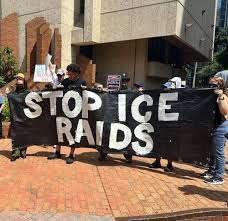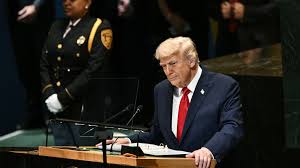
Washington, D.C. — June 14, 2025
In a significant and unexpected policy shift, the Trump administration has ordered Immigration and Customs Enforcement (ICE) to suspend worksite enforcement operations at agricultural farms, restaurants, and hotels, according to two sources familiar with the decision who spoke to Les Indomptables on condition of anonymity.
The move comes amid mounting pressure from key industry leaders who argue that the administration’s aggressive stance on immigration is severely impacting the U.S. economy. These industries, which heavily rely on immigrant labor ,including many undocumented workers;have reported labor shortages and operational disruptions following intensified ICE raids and deportations.
The directive marks a major departure from President Trump’s longstanding hardline approach to illegal immigration. Since taking office, the administration has promised to deport millions of undocumented immigrants, regardless of their criminal history. However, the recent pause in enforcement suggests a growing acknowledgment within the administration of the economic implications tied to labor crackdowns in essential sectors.
Economic Pressure Forces a Tactical Retreat
Over the past year, industry groups representing agriculture, hospitality, and food services have raised concerns over what they describe as a “chilling effect” caused by ICE operations. Employers reported a sharp decline in job applications and an exodus of workers from rural areas and cities alike, fearing arrest and deportation.
“The president was reportedly unaware of the full extent of ICE’s worksite activities and the disruption they were causing,” one source told Les Indomptables . “Once briefed on the economic consequences, there was a quick pivot.”
A Broader Immigration Backlash
The change in policy comes at a time of heightened public scrutiny over the administration’s immigration enforcement tactics. ICE arrests have surged nationwide, triggering widespread protests in major cities such as Los Angeles, where federal agents have conducted operations in residential areas and commercial zones. In response to escalating tensions and sporadic violence, President Trump controversially deployed National Guardsmen and U.S. Marines to support ICE operations, drawing criticism from civil rights advocates and local governments.
Political Calculations Ahead
Analysts suggest the administration’s decision may also reflect a strategic recalibration as the country approaches a new election cycle. With economic growth under pressure and public support for comprehensive immigration reform growing, the White House may be seeking to avoid alienating business allies and moderate voters.
Still, the pause in enforcement is likely to provoke criticism from immigration hardliners who see the measure as a betrayal of the president’s core campaign promises. On the other hand, immigrant advocacy groups say the suspension does not go far enough and continue to call for a permanent halt to what they describe as indiscriminate and harmful raids.
While temporary, the suspension of ICE operations at key workplaces represents a rare moment of concession by the Trump administration to economic and political realities. Whether this signals a longer-term softening of immigration policy or merely a tactical pause remains to be seen. For now, the livelihoods of thousands of workers and the viability of entire industries hang in the balance.






